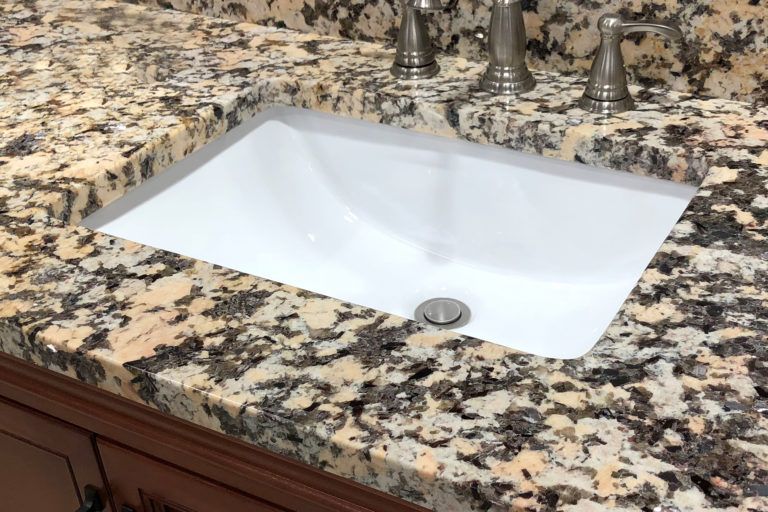
Quick Tips
- Choose an easy daily routine to clean granite.
- For deeper granite cleaning, try not to go overboard.
- Protect your granite from damage.
- Polish your granite from time to time to make it sparkle.
- If something spills on your granite countertop or floor, take care of it immediately.
- Look into a granite sealer for extra protection.
Consider granite to be the godfather of all natural stones, the one that marble might go to for advice or slate, with a question. It’s absolutely beautiful, which is surely one of the reasons it’s so beloved, but better than that it’s tough. A diamond is the only thing certain to scratch granite’s surface, but your new set of knives? Probably not. This is why you can find granite in kitchens, where knives are cutting and hot pans are set down without a thought. This stuff can hold its own.
But then you have to clean it. Especially because it’s not cheap to install granite countertops or granite flooring, the thought of cleaning it – and causing damage in the process – can be horrifying. Like marble and most natural stones, granite does not respond well to things acidic, like lemons and wine and especially vinegar. If you remember one thing, remember this: do not use vinegar to clean your granite. Vinegar is an amazing, natural cleaning agent, but it can etch (dull) your granite. Instead, when you wonder how to clean granite, think simply. Start with the basics, and go from there…only if you need to.
Cleaning Granite Countertops and Floors
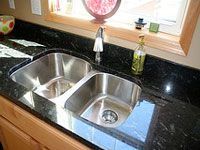 Choose an easy daily routine to clean granite.Warm/hot water and a soft cloth (microfiber works really well) should be sufficient for your countertops on a daily basis. If possible, use distilled water rather than city water, just in case there is high chlorination or other mineral content. To prevent water spots, always be sure to dry your countertops thoroughly with a fresh soft cloth. For your granite floors, dust-mop daily to prevent grit from building up; microfiber works really well for this, too. If there are stubborn marks, try using hot water with your mop.
Choose an easy daily routine to clean granite.Warm/hot water and a soft cloth (microfiber works really well) should be sufficient for your countertops on a daily basis. If possible, use distilled water rather than city water, just in case there is high chlorination or other mineral content. To prevent water spots, always be sure to dry your countertops thoroughly with a fresh soft cloth. For your granite floors, dust-mop daily to prevent grit from building up; microfiber works really well for this, too. If there are stubborn marks, try using hot water with your mop.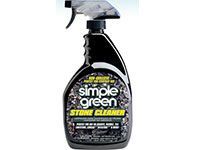 For deeper granite cleaning, try not to go overboard. A ph-neutral dishsoap like Seventh Generation works really well, as long as you make sure to rinse thoroughly and then dry. If you want something a little stronger, you can try Simple Green Stone Cleaner – it’s natural and safe to use. Household products like hydrogen peroxide (on light granite only, to be safe), acetone (dark granite) or clear ammonia work, too, but be careful of ammonia – it can dull your granite over time. For your granite floors, hot water or a stone cleaner will keep it clean and looking good.
For deeper granite cleaning, try not to go overboard. A ph-neutral dishsoap like Seventh Generation works really well, as long as you make sure to rinse thoroughly and then dry. If you want something a little stronger, you can try Simple Green Stone Cleaner – it’s natural and safe to use. Household products like hydrogen peroxide (on light granite only, to be safe), acetone (dark granite) or clear ammonia work, too, but be careful of ammonia – it can dull your granite over time. For your granite floors, hot water or a stone cleaner will keep it clean and looking good.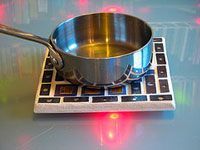 Protect your granite from damage. It’s a lot easier to take preventative measures against stains and scratches than to try to deal with them. For your granite countertops, use coasters for drinks and trivets/pot holders for hot items. Even though a boiling pan of spaghetti probably won’t mark your granite, it will heat it up fast – especially if it’s dark – and possibly cause other problems (like you burn yourself). Also, grit could get trapped in between the pot and the counter and possibly scratch your granite. Use a cutting board even if knives are unlikely to scratch granite; at least you’ll keep your knives from dulling. Put felt pads underneath a tray for any bathroom/cosmetic products, and…don’t sit on your countertops. For granite flooring, put rugs in high-traffic areas to protect against grit that can be carried in on shoes, and use pads under any furniture that touches the granite.
Protect your granite from damage. It’s a lot easier to take preventative measures against stains and scratches than to try to deal with them. For your granite countertops, use coasters for drinks and trivets/pot holders for hot items. Even though a boiling pan of spaghetti probably won’t mark your granite, it will heat it up fast – especially if it’s dark – and possibly cause other problems (like you burn yourself). Also, grit could get trapped in between the pot and the counter and possibly scratch your granite. Use a cutting board even if knives are unlikely to scratch granite; at least you’ll keep your knives from dulling. Put felt pads underneath a tray for any bathroom/cosmetic products, and…don’t sit on your countertops. For granite flooring, put rugs in high-traffic areas to protect against grit that can be carried in on shoes, and use pads under any furniture that touches the granite.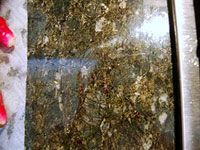 Polish your granite from time to time to make it sparkle. Want to know how to polish granite naturally? Try a chamois on a clean, damp surface – the cloth should buff your granite to a nice shine. If you’d like more shine, there are a lot of commercial granite polishers out there – but you can also make your own. Mix one part rubbing alcohol with three parts water and a few drops of ph-neutral dishsoap. Apply this solution to your granite with a spray bottle, then wipe with a soft cloth. You can also make a polish with 1/4 cup baking soda to 3 cups water. Apply with a soft sponge, wipe up excess liquid and then buff with a chamois. A note: polishing your granite floor can make it very slick, so either skip this step or be extremely careful.
Polish your granite from time to time to make it sparkle. Want to know how to polish granite naturally? Try a chamois on a clean, damp surface – the cloth should buff your granite to a nice shine. If you’d like more shine, there are a lot of commercial granite polishers out there – but you can also make your own. Mix one part rubbing alcohol with three parts water and a few drops of ph-neutral dishsoap. Apply this solution to your granite with a spray bottle, then wipe with a soft cloth. You can also make a polish with 1/4 cup baking soda to 3 cups water. Apply with a soft sponge, wipe up excess liquid and then buff with a chamois. A note: polishing your granite floor can make it very slick, so either skip this step or be extremely careful.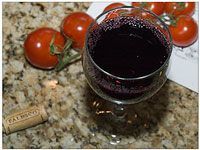 If something spills on your granite countertop or floor, take care of it immediately. Although granite doesn’t stain as easily as other natural stones, it can happen. If something spills, get to it as soon as you can and blot rather than wipe to avoid spreading the spill. If you do find yourself with a stain on your granite, try a poultice. You can purchase a ready-made one, but it’s easier and just as effective to make one yourself. Mix a fine powder – baking soda or whiting – with a liquid until you get a peanut butter-like consistency. For oil-based stains, mix the powder with water or rubbing alcohol; for water-based ones, use hydrogen peroxide or acetone. Dampen the part of the granite that is stained and then spread the poultice over the stain. Leave until the mixture dries – usually a day or two – and then remove, rinse and wipe your granite dry.
If something spills on your granite countertop or floor, take care of it immediately. Although granite doesn’t stain as easily as other natural stones, it can happen. If something spills, get to it as soon as you can and blot rather than wipe to avoid spreading the spill. If you do find yourself with a stain on your granite, try a poultice. You can purchase a ready-made one, but it’s easier and just as effective to make one yourself. Mix a fine powder – baking soda or whiting – with a liquid until you get a peanut butter-like consistency. For oil-based stains, mix the powder with water or rubbing alcohol; for water-based ones, use hydrogen peroxide or acetone. Dampen the part of the granite that is stained and then spread the poultice over the stain. Leave until the mixture dries – usually a day or two – and then remove, rinse and wipe your granite dry.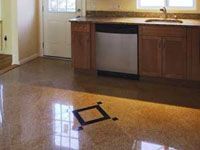 Look into a granite sealer for extra protection. The best thing to do if you want to apply granite sealer is to first get information about your granite. Was sealer applied at the time of installation? If so, what brand was used and how often does it need to be reapplied? Also, know the type of granite you have; some granite, especially if it’s dark, does not need to be sealed as often. Some types of black granite, in fact, do not need to be sealed at all. Granite sealers resist moisture and help prevent against stains, so they’re generally a good idea. Just make sure you use one that is non-toxic if you’re dealing with granite countertops where food is prepared.
Look into a granite sealer for extra protection. The best thing to do if you want to apply granite sealer is to first get information about your granite. Was sealer applied at the time of installation? If so, what brand was used and how often does it need to be reapplied? Also, know the type of granite you have; some granite, especially if it’s dark, does not need to be sealed as often. Some types of black granite, in fact, do not need to be sealed at all. Granite sealers resist moisture and help prevent against stains, so they’re generally a good idea. Just make sure you use one that is non-toxic if you’re dealing with granite countertops where food is prepared.
Is Granite Toxic?
There’s a lot of buzz out there about the possible health risks associated with radon emitted from granite countertops. At issue is not whether granite emits radon and other forms of radiation – for years it’s been understood that it does – but whether these emissions are at a level high enough to be considered dangerous. Radon is the second-leading cause of lung cancer, so the topic is certainly worth some discussion. However, when it comes to granite, not enough sufficient data yet exists to allow anybody to take an official stand. Granite comes from quarries all over the world, and more of it needs to be tested.
Before I have you totally freaked out, let me say this: most researchers seem to agree that your granite countertops are probably fine. Of the samples that have been tested, only a small fraction of them gave off elevated radon levels – and even these, some researchers say, are not cause for concern. (Well, maybe if you’re sleeping on your granite countertops every night…). It is a good idea anyway, though, to have your home tested for radon. The bigger source of radon, by far, is the ground – the odorless, colorless, tasteless gas can seep into your house after it’s released through the natural decay of uranium. Test kits are available at most hardware and home improvement stores and through various Internet sites, or you can contact your city to find a professional. Bottom line: it’s smart to test for radon, irregardless of granite countertops.
Cleaning Granite Naturally
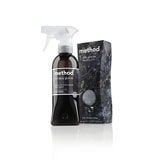 Method Microfiber Cloth.It’s soft enough for your granite, and it will catch dirt and crumbs in no time flat. The microfibers even help clean, so you don’t necessarily need anything else but water most of the time. Better yet: because it’s washable you can use it over and over again, which means you’re not contributing to the waste of a bunch of trees. How much greener can you get?
Method Microfiber Cloth.It’s soft enough for your granite, and it will catch dirt and crumbs in no time flat. The microfibers even help clean, so you don’t necessarily need anything else but water most of the time. Better yet: because it’s washable you can use it over and over again, which means you’re not contributing to the waste of a bunch of trees. How much greener can you get?
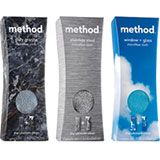 Method: The Daily Granite. If you want to buy a cleaner to go with that spiffy new microfiber cloth, this is good stuff to get. Plus, it looks quite nice sitting next to the microfiber, if you ask me. Method does a great job of putting out stuff that is kind to the environment and to you. If you spill it all over yourself, you don’t have to worry! Added bonus. The Daily Granite also comes in wipe form, and there’s a granite polish available if you really want to impress people. That matches, too. You can order bottles of Method Granite Cleaner from Amazon.
Method: The Daily Granite. If you want to buy a cleaner to go with that spiffy new microfiber cloth, this is good stuff to get. Plus, it looks quite nice sitting next to the microfiber, if you ask me. Method does a great job of putting out stuff that is kind to the environment and to you. If you spill it all over yourself, you don’t have to worry! Added bonus. The Daily Granite also comes in wipe form, and there’s a granite polish available if you really want to impress people. That matches, too. You can order bottles of Method Granite Cleaner from Amazon.
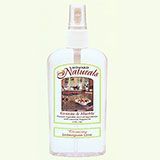 Howard Naturals Marble and Granite Cleaner.If you’re someone who loves scented cleaners (I’m a recovering Pine Sol girl myself) but would like to hold onto some brain cells, give Howard a try. Its granite cleaner comes in three scents: grapefruit-ginger, lemongrass-lime and sage-citrus. Derived from vegetables, this stuff is non-toxic and – very important for granite countertops – safe for food preparation surfaces.
Howard Naturals Marble and Granite Cleaner.If you’re someone who loves scented cleaners (I’m a recovering Pine Sol girl myself) but would like to hold onto some brain cells, give Howard a try. Its granite cleaner comes in three scents: grapefruit-ginger, lemongrass-lime and sage-citrus. Derived from vegetables, this stuff is non-toxic and – very important for granite countertops – safe for food preparation surfaces.